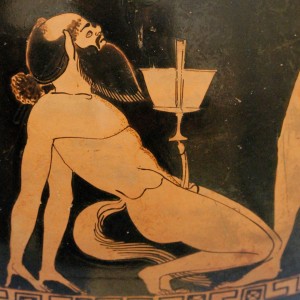
A cavorting satyr of old balances a wine-cup on his penis. This satyrical depiction is from an Attic red-figured jug that is signed by the otherwise unknown painter Douris, c. 500 – 490 BC. The photo is by Marie-Lan Nguyen and is in the public domain via Wikimedia Commons.
I am afraid there has been a rape. This vile act of aggression was perpetrated on a barbarian woman by a noisy band of horse-tailed wildmen native to the Satyr islands. Knowledge of the astonishing spectacle is entirely dependent on the eyewitness testimony of a 2nd century sailor named Euphemos. The travel log writer Pausanias, who had a keen interest in these wildmen, known as satyrs, documented the sailor’s tale in his description of classical Greece [1]:
A Carian called Euphemos said he was sailing to Italy and was driven off course, right out into the open sea, which is still empty. He told me there were a lot of desert islands, and islands where savages lived; the sailors were unwilling to put into these islands, as they knew something about the natives from having called there before, but now they were forced to put in again. The sailors call them the Satyr islands. The natives are very noisy and have tails on the behinds as long as a horses. As soon as they noticed the ship, they ran down at it without saying a word and grabbed at the women. In the end the sailors were so frightened they threw out a barbarian woman onto the island, and she was raped by the satyrs not only in the usual place but all over her body.
Under usual circumstances I would quote from the W.H.S. Jones and H.A. Ormerod 1918 edition [2], which, being out of copyright, is freely available at The Perseus Digital Library. In this case, however, I found their translation to be unnecessarily prudish, and have therefore quoted from the comparatively faithful translation of Peter Levi [1].
References
[1] Pausanias Guide to Greece 1: Central Greece translated by Peter Levi (1984), Penguin Classics, Book I, Chapter 25, Sections 5-6.
[2] Pausanias Description of Greece translated by William Henry Samuel Jones and Henry Ardene Ormerod (1918), Harvard University Press, Book I, Chapter 23, Sections 5-6. Read this passage about the rape on the Satyr islands at The Perseus Digital Library.

